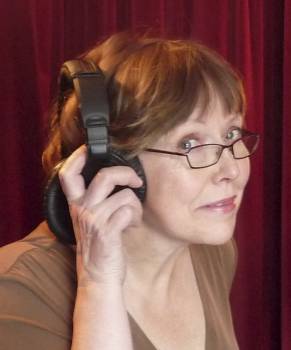|
VOCAL HEALTH - Part 2 First Step To A Cure - Admit You Have A Problem. What Mary Found ...  By
Elizabeth Holmes By
Elizabeth Holmes
Voice Actor & VOXtra Staff Editor OK. So, say you’ve been taking good care of your vocal health (see Part I in this series), but you’re still feeling a bit green around the gills. You’re drinking lots of water. You’re resting your voice. And you’re telling yourself that the reason your voice still isn’t right is because that "cold” you caught was just a bit nastier than usual. Well, maybe that’s true. Or maybe it’s something more serious. The American Academy of Otolaryngology cautions: "Listen to
your voice. When your voice is complaining to you, listen to it. Know that
you need to modify and decrease your voice use if you become hoarse in
order to allow your vocal cords to recover. "Pushing your voice when it’s already hoarse can lead to significant problems. If your voice is hoarse frequently, or for an extended period of time, you should be evaluated by an otolaryngologist (Ear, Nose and Throat physician.)” The University of Michigan Vocal Health Center lists other symptoms that can be warning signs for potential voice disorders:
ADMIT YOU HAVE A PROBLEM Consider the case of Mary (not her real name), a hard-working voice actor who ignored her own voice issues until they became unmanageable. "For me, it was a little bit like Alcoholics Anonymous," she quips. "The first thing I had to do was admit I had a problem!” Mary’s career took off three and a half years ago, with a daily schedule that included long hours of narration. "Think of it this way,” she explains. "If you’re a long-distance runner, you can probably do a few races without warm-ups and proper technique. But eventually, if you don’t train the right way, you’ll injure yourself and have problems.” PHYSICIAN DISCOVERS PROBLEMS Mary’s wake-up call came in the form of feedback from a sound engineer who requested raw audio, then questioned why she sent him so many takes of one simple statement. "What he didn’t understand was that I couldn’t get it right in one take!” A skilled physician at Osborne Head & Neck Institute in Los Angeles soon identified Mary’s problems. He sent a scope down her throat that sent back images to a computer screen that Mary watched in real time. DISCOVERS THREE PROBLEMS The results of this exam were evidence of a muscular imbalance on one side of her neck, dehydration, and acid reflux damage. "The scope made it real for me,” Mary reports. "I was completely shocked when they told me I had acid reflux. I had no idea I had it! I probably should have guessed, because I was hoarse all the time, always clearing my throat, and I had lots of mucus. "Once I started taking medication for acid reflux, 60% of my problems disappeared.” THERAPY AND PROPER WARM-UPS As for the other 40%, voice therapy came to the rescue. Working with skilled professionals at Cedars-Sinai, Mary had a second, more comprehensive scope, which revealed details about the tension in the muscles of her throat. Through voice therapy, Mary learned how to:
VOCAL COACH FIXES PIPES A good vocal coach can make all the difference in a performer’s career. My first exposure to vocal health matters was through Judy Davis, a singing coach in the San Francisco Bay Area who described herself as "a vocal plumber – I fix pipes.” Judy’s students included Barbra Streisand, Frank Sinatra, Judy Garland and Grace Slick. Tragically, Judy’s own singing career was cut short (literally), when a botched tonsillectomy injured her vocal cords. Fortunately for the rest of us, that accident inspired Ms. Davis to study how voices work. For the balance of her long and distinguished career, anyone who studied with Judy Davis received a healthy dose of vocal care instruction, along with their breathing exercises and warm-ups. BEWARE HARSH TECHNIQUES Voice acting coach Zoller emphasizes the importance of finding the right instruction for voice actors. She cautions: "Never work with anyone who uses 'scream therapy' or other harsh techniques that damage your vocal cords! Guard your ears, too. Loud headphones can damage your hearing.” Zoller recommends learning more about voice therapy through the websites of the Voice & Speech Trainers Association (VASTA) and the Voice Foundation. And for practical advice on releasing tension to improve vocal performance, see VoiceOver Xtra’s archives for Dr. Anne Utterback’s article: Warning: A Tense Body Creates a Tense Voice – How to Relax. In Part 3 of this series, we’ll talk to doctors who specialize in diagnosing and treating voice problems. ABOUT ELIZABETH ...  Author Elizabeth Holmes is a voice actor, writer and audiobook narrator based in Healdsburg, CA.
She is also editor of VoiceOverXtra's eBook division. Author Elizabeth Holmes is a voice actor, writer and audiobook narrator based in Healdsburg, CA.
She is also editor of VoiceOverXtra's eBook division.Email: Elizabeth@HolmesVoice.com Web: www.HolmesVoice.com |
As of the NEW website launch, 03/22/2012


.png)







What a wonderful article! But it's a shame that many of those who need it, won't see it!
Many times...ok, maybe only "several"...when I was a morning radio news anchor who also had to cover late/long city council meetings, I would top out the night with buddies by bending my elbow a bit.
As the night wore on, I could feel the "twinges" in my vocal cords. But, I kept on "holding court."
By the next morning, my voice had a distinctively "different" sound that I could only apologize for...and get the morning DJ onboard to be sympathetic with.
Truth is, I "strained" my voice the night before (argument: strain the voice to get the scoop!).
I'm not unique...It happens all the time across America. Good article! Too bad most morning anchors aren't in tune with VoiceoverXtra.com. They'll NEVER see this! More's the pity!
Jay